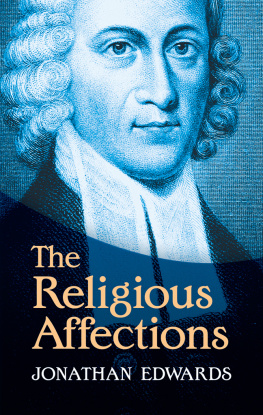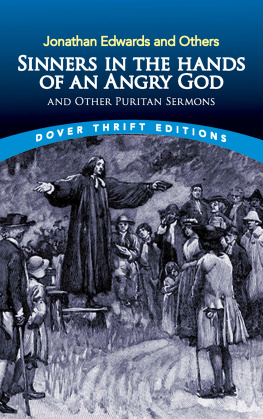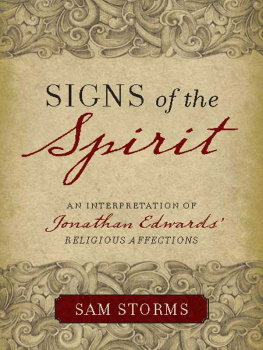
2013 by Barbour Publishing, Inc.
Editorial assistance by Jill Jones.
Print ISBN 978-1-62416-713-3
eBook Editions:
Adobe Digital Edition (.epub) 978-1-62836-351-7
Kindle and MobiPocket Edition (.prc) 978-1-62836-352-4
All rights reserved. No part of this publication may be reproduced or transmitted for commercial purposes, except for brief quotations in printed reviews, without written permission of the publisher.
Churches and other noncommercial interests may reproduce portions of this book without the express written permission of Barbour Publishing, provided that the text does not exceed 500 words and that the text is not material quoted from another publisher. When reproducing text from this book, include the following credit line: From Religious Affections, published by Barbour Publishing, Inc. Used by permission.
All scripture quotations, unless otherwise indicated, are taken from the New King James Version. Copyright 1982 by Thomas Nelson, Inc. Used by permission. All rights reserved.
Cover image ingar wesemann/Getty
Published by Barbour Publishing, Inc., P.O. Box 719,
Uhrichsville, Ohio 44683, www.barbourbooks.com
Our mission is to publish and distribute inspirational products offering exceptional value and biblical encouragement to the masses.

Printed in the United States of America.
I NTRODUCTION
You probably know him as preacher of the sermon Sinners in the Hands of an Angry God. But Jonathan Edwards had much more to say about the Christian life.
Born in 1703 in what was then known as the Connecticut Colony, Edwards would become the central figure in New Englands first Great Awakening, a massive Christian revival of the 1730s and 1740s. Sinners in the Hands of an Angry God, preached to Edwards church in Northampton, Massachusetts, in 1741, was a powerful influence in the revival.
A student at Yale by age thirteen, Edwards showed brilliance in many fieldsand is known as one of Americas greatest intellectuals. Though deeply interested in the sciences (Edwards would die at age fifty-four, after taking an experimental smallpox inoculation), he is best known as a preacher and theologian, leaving behind a vast body of work that includes A Treatise Concerning Religious Affections, written in 1746.
This abridged edition of Religious Affections contains approximately 20 percent of Edwards original, with language lightly updated for ease of reading. In the pages that follow, youll find a detailed description of the signstrue and falseof conversion, along with an explanation of the role truly balanced emotions play within the Christian life.
Edwards provides an in-depth look at the evidence of true saving faith: the fruit that comes from living like Christ.
A UTHORS P REFACE
Undoubtedly, the most important concern of every individual is this: What distinguishes those who are in favor with God, entitled to His eternal rewards? Or, What is the nature of true faith? And how do we know when we have the virtue and holiness that are acceptable in Gods sight? Even though these are important questions, and we have clear light in Gods Word to provide us with their answers, there is no other point where professing Christians differ more from one another. They divide the Christian world, making obvious the truth of our Saviors declaration, Narrow is the gate and difficult is the way which leads to life, and there are few who find it (Matthew 7:14).
For a long time the consideration of these things has kept me busy. The subject has absorbed me ever since I first began my theological studies. How successful Ive been must be left to the readers judgment.
Many will probably be disappointed to find that I condemn so much that has to do with religious affection; others may be indignant and disgusted that I justify and approve so much. And some may accuse me of being inconsistent when I approve some things and condemn others. That so much good and so much bad should be mixed together in the church of God is indeed very mysterious, just as it is a mystery that the saving grace of God and the new and divine nature should dwell with so much corruption, hypocrisy, and iniquity in the heart of the same Christian. No matter how mysterious, however, these are realities. False religion often thrives at the same time as great revivals of true faith, and hypocrites spring up among true saints.
Therefore, we need to do our best to clearly discern, without any doubt, just what makes true faith. Until we do, we can expect religious revivals to last only a short while; until we do, all our discussion will do little good, since we have so little idea what we are aiming toward.
My aim is to show the nature and signs of the grace-filled operations of Gods Spirit, what distinguishes them from all other human influences that have no power to redeem. I hope my efforts will promote humanitys relationship with Godbut whether or not I succeed in shedding some light on this subject, I hope Gods mercy will grant that readers will believe in my sincerity. I hope also for the honesty and prayers of the true followers of Gods meek and loving Lamb.
Part I

T HE N ATURE OF A FFECTIONS, AND T HEIR I MPORTANCE TO R ELIGION
Whom having not seen you love. Though now you do not see Him, yet believing, you rejoice with joy inexpressible and full of glory.
P ETER 1:8
W ith these words the apostle demonstrates the state of mind of the Christians to whom he wrote. In the two preceding verses, he speaks of their trials: the trial of their faith, their being in heaviness through manifold temptations. These trials benefit true faith in three ways.
First, trials like this have a tendency to distinguish between true faith and false. That is why in the verse immediately preceding the text, and in innumerable other places, they are called trialsbecause they try the faith of people who profess to be Christians, just as apparent gold is tried in the fire to see whether it is true gold or not. When faith is tried this way and proven to be true, it is found to praise, honor, and glory (1 Peter 1:7).
Second, these trials are of further benefit to true faith, not only because they reveal its truth, but also because they make its genuine beauty and sweetness remarkably clear. True virtue never looks so lovely as when it is most oppressed, and the divine excellence of real Christianity is never demonstrated as clearly as when it faces trials.
Last, trials benefit true faith by purifying and strengthening it. They not only show its reality, but they also tend to refine it, delivering it from anything that might get in its way, so that all thats left is whats real. Trials tend to make the loveliness of true faith appear at its best advantage, while also tending to increase its beauty by planting it firmly, making it more lively and vigorous, purifying it from anything that dulls its shiny glory. When gold is tried in the fire, its impurities are purged, and it comes out more solid and beautiful, and in the same way when true faith is tried in the fire, it becomes more precious and is found to praise, honor, and glory.


















